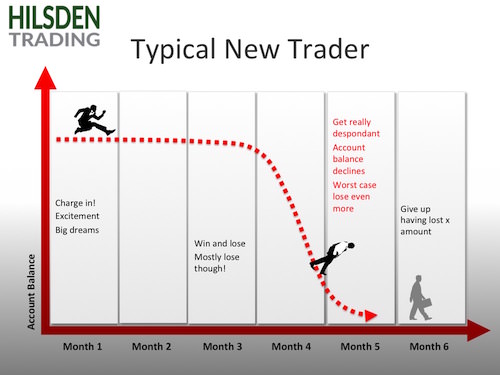I am sure you have heard the statistic that 90% of people that start spread betting fail and from that inferred that it is nigh on impossible to make a success of it. As you can see from my results I am not in that 90%. So, how can you avoid being in that group too? There are a whole range of reasons why traders fail and I have set out a few below. If you would like to avoid falling into the failed trader camp I would bear these in mind! To overcome them please consider joining or attending one of the seminars

The main issues facing new traders are:
- Overtrading
- Chasing losses
- Gambling – no discipline
- Stake too big (as a % of capital)
- No control over emotions
- Cut winners too soon – But dont let a winner become a loser
- Adding to losing trades – Better to cut and run I feel
There are of course other reasons but these are the main ones in my opinion. Despite what you read about “working” for half an hour a day and making untold wealth, it requires skills and knowledge. Join me and you can learn what you need to do.
New traders can fail for a variety of reasons.
Here are some common factors that contribute to their failures:
1. Lack of Knowledge and Education: Trading in financial markets requires a solid understanding of various concepts, strategies, and tools. Many new traders jump into trading without sufficient knowledge or education, leading to poor decision-making and potential losses.
2. Emotional Decision-Making: Emotions play a significant role in trading, and new traders often struggle to control their emotions, particularly fear and greed. Emotional decision-making can lead to impulsive trades, failure to stick to a trading plan, and taking excessive risks.
3. Inadequate Risk Management: Proper risk management is crucial in trading. New traders may fail to implement risk management techniques like setting stop-loss orders or position sizing, which can result in significant losses when trades go against them.

4. Unrealistic Expectations: Many new traders enter the markets with unrealistic expectations of making quick profits. They may fall for get-rich-quick schemes or rely on unreliable trading strategies, leading to disappointment and financial losses.
5. Lack of Discipline and Patience: Trading requires discipline and patience. New traders may struggle to stick to their trading plans, overtrade, or chase after every market opportunity without proper analysis. These impulsive behaviors can lead to losses and inconsistent results.
6. Insufficient Capital: Trading with insufficient capital can be a significant hurdle for new traders. Inadequate funds may limit their ability to withstand market fluctuations, forcing them to close positions prematurely or take on excessive risks to compensate for limited resources.
7. Failure to Adapt to Changing Market Conditions: Markets are dynamic, and new traders may struggle to adapt to changing trends, volatility, or economic factors. Lack of flexibility and adaptability can hinder their ability to adjust strategies and capitalise on different market conditions.
8. Overreliance on Indicators or Systems: New traders often fall into the trap of relying too heavily on indicators or trading systems without understanding their limitations. Blindly following signals without considering market context can lead to poor trading decisions.
9. Lack of Trading Plan and Strategy: Successful trading requires a well-defined trading plan and strategy. New traders may fail to develop a clear plan, including entry and exit rules, risk management guidelines, and contingency plans. Without a plan, they are more likely to make impulsive decisions.
10. Inadequate Preparation and Practice: Trading is a skill that requires practice and experience. New traders may fail to dedicate enough time to learning and practicing their strategies. Lack of preparation can leave them ill-equipped to handle the challenges and uncertainties of trading.
It’s important for new traders to recognise these common pitfalls and take steps to address them. Education, practice, discipline, risk management, and a realistic mindset are key to improving their chances of success in trading.







